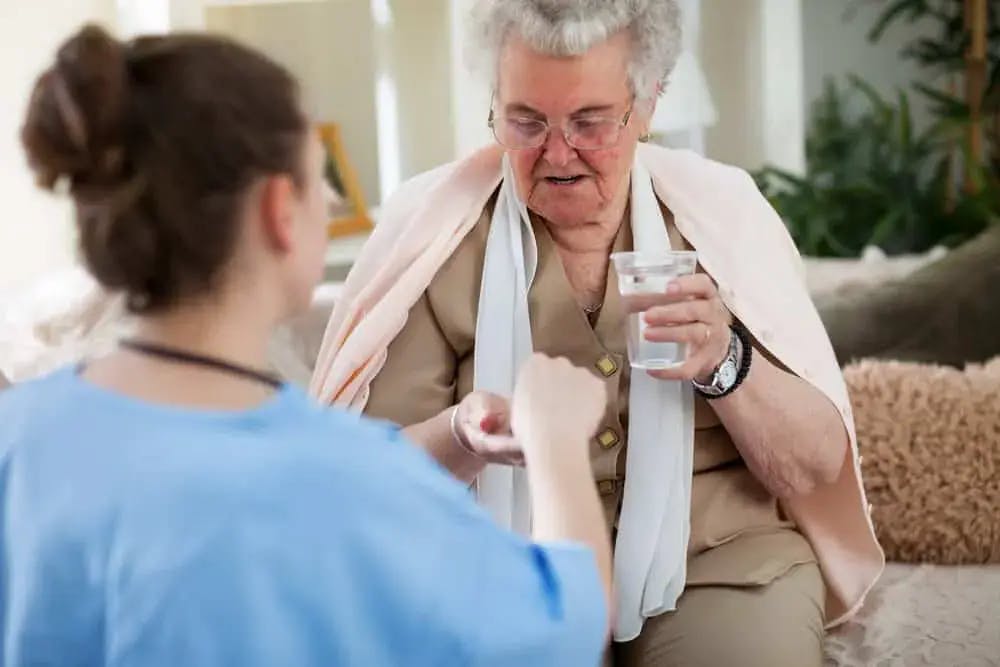Administration of Medicine in a Care Home: Who is Responsible?

Estimated Reading Time: 7 minutes
Medication plays an important role in care home life, which is why administering medicine to individual residents must be done carefully while following the guidelines
There are several things to consider when it comes to administering medication in a care home, including which members of staff can do so, what training is required, whether residents can self-administer medication and how to keep records of medicine that has been administered.
Kickstart your care search
Find the best care homes in your area through Lottie.
In this article:
- Which members of staff can administer medication in a care home?
- What training do staff need to administer medication?
- Self-administration of medicine
- Keeping medical records
- Medicine administration (MAR) charts
- Residents’ rights
- Care home policies for safely administering medication
Which Members Of Staff Can Administer Medication In a Care Home?
Nurses
Registered nurses are always found in nursing homes. Registered nurses or medical practitioners will usually administer intravenous medication and controlled drugs.
Registered nurses care for residents who require specific medical care and support. This includes providing and administering:
- Suppositories
- Injectable drugs such as insulin
- Gastronomy procedures
- Oxygen
Sometimes, a registered nurse will delegate some of their tasks to other staff members, such as care assistants. In this case, the nurse must ensure the care assistant can safely administer the medication.

Care assistants
Care assistants can also administer oral medication in a care home, as long as they’ve had the proper training.
The Department of Health’s Administration of Medicines in Care Homes (with Nursing) for Older People by Care Assistants (2016) says that care assistants with suitable training can legally administer medication to care home residents. In this case, the home’s manager should regularly review a care assistant’s knowledge of medication administration and how they go about doing so.
The Department of Health also states that a care assistant must ensure any medication administration is carried out carefully and safely. This includes checking the exact dosage - a critical component of medicine administration.
We’re here to help you find the right care home for you or your loved one. You can request a free list of care homes from our Care Experts, who will then share homes matching your budget, location and type of care needed. You can also search for care through our easy-to-use directory.
What Training Do Staff Need To Administer Medication?
Care home staff must be properly trained for the safe administration of medication. This training focuses on the following:
- Safely storing and disposing of medication
- Safely administering medication (including the correct dosage)
- Keeping records of all medication that’s been administered
- Keeping residents’ care confidential where necessary
- Reporting any errors or incidents
- Other good practice measures
Staff may also need to be trained in areas specific to the administration of medicine, such as:
- Administering inhaled medicines such as asthma pumps
- Administering eye drops, ear drops or nasal sprays
- Applying creams or ointments
- Assisting residents to take tablets, capsules or other oral medication
Care home training programmes can be delivered internally or externally, but the goal remains the same: to teach staff how to manage and administer medicine while eliminating medication administration errors.
Additional training may also be required for administering medication via invasive or specialised techniques. Training should be conducted by an accredited learning provider and the course needs to meet the requirements of the regulators, care home residents and the training needs of the care home staff.
Depending on the type of care home (such as a residential care home or nursing home), staff may need to undergo different types of training. Training should be regularly reviewed by the care home manager to ensure any knowledge gaps or changes in techniques are addressed.
Finally, staff should also receive training on the correct protocol in the event that a care home resident refuses to take medication. This is usually discussed in the home’s policies and procedures.
Self-Administration Of Medicine
If you’re going into a care home and you’re capable of administering your own medication, then depending on the results of a risk assessment, you’ll be able to do so. This assessment will determine whether you’re able to manage your own medication and how much support you need to do so safely.
CQC and NICE guidance includes key information on the rights of care home residents to manage their own medication, including the policies that should be in place for this, how to carry out individual risk assessments and what support should be given to self-administering residents.
Dosette boxes make the self-administration of medicine easier.
When it comes to the self-administration of medication, care home staff should take the following into account:
- Will a resident self-administering medication pose a risk to themselves or other residents?
- Can the resident be trusted to take the correct medication dosage at the correct time, and in the correct way?

Keeping Medical Records
It’s important to keep comprehensive medical records for each care home resident, as this ensures everyone is given the correct medication at the right times of the day.
There’s a statutory requirement that records are kept for all medicines in care homes. The exact details for each care home can be found in the home’s rules and regulations, as well as the Independent Healthcare Regulations or the Regulation of Care (Scotland) Act 2001.
Medicine Administration (MAR) Charts
Medication Administration Record (MAR) charts are documents that care home staff or other healthcare professionals sign for record-keeping purposes of which medication was administered and when.
MAR charts are normally used for prescription medication, but can also be used in certain circumstances when non-prescription medicines are given.
Any medicine administered that gets recorded needs to be signed and dated. This is helpful for staff swapping shifts, as it allows them to keep track of which resident has been given what.
All care homes must keep a list of staff members who are authorised to administer medication and their approved initials to check against MAR charts.
Residents’ Rights
When it comes to medication management, care home residents have the right to choose how their medication is managed, whether this is choosing to administer their own medication (if they’re able to do so) or having medication administered by care home staff. Residents can also refuse medication.
Care home staff shouldn’t administer medication to a resident without their knowledge or consent if the resident can make their own decisions about their medication.
However, different rules apply to residents who can’t make decisions for themselves or have been detained under the Mental Health Act (1983). It won’t always be safe for these residents to make their own decisions about medication management.
Care Home Policies For Safely Administering Medication
Every care home must have a written policy detailing the safe administration of medicine.
This policy should include the following:
- Medication records for every resident
- Which members of staff are qualified to administer medication
- How to review a resident’s medication
- How to order, store and safely dispose of medication
- The procedures in place for correctly reporting and dealing with any medication-related incidents
Care home policies should be regularly reviewed and updated.
Lottie matches care seekers with the best care homes for their needs. You can request a free care home shortlist from our Care Experts, who will share homes matching your budget, location and type of care needed. You can also search for care through our easy-to-use directory.
Frequently Asked Questions
What are the main responsibilities when administering medication?
When administering medication, your main responsibilities are:
- Ensuring the correct medication and dosage are administered
- Ensuring this medication is administered in the correct way
- Ensuring this medication is given to the right person when they need it
- Ensuring the administration of medication is properly logged
Can a care assistant administer medication?
While care assistants can legally administer oral medication, they need to have been trained to do so. This training should include how to properly store medicine and how to keep records of what each resident requires and at what times of day.



